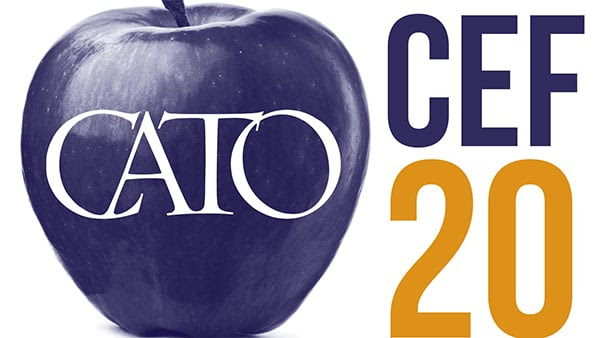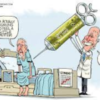![]()
| CITY SEMINAR |
| October 25, 2022 • 10:30AM – 2:00PM EDT583 Park Avenue, New York, NY 10065 |
| The Cato Institute invites you to a seminar and luncheon in cooperation with the Smith Family Foundation.Featured speakers:Peter Goettler, President and CEO, Cato InstituteMarian Tupy, Senior Fellow, Center for Global Liberty and Prosperity, Cato Institute; Editor, HumanProgress.orgVanessa Brown Calder, Director of Opportunity and Family Policy Studies, Cato InstituteJohn McWhorter, Associate Professor, Columbia UniversityPlease join us in New York on October 25, we will begin at 11:00 AM with welcome remarks. 583 Park Avenue, New York, NY 10065 Walk-in registration will be available on site. |

| POLICY FORUM |
| October 26, 2022 • 12:00PM – 1:30PM EDT |
| The public’s reliance on social media platforms has created new opportunities for censorship by proxy, despite the First Amendment’s prohibition on government speech regulation. Will Duffield’s recent policy analysis “Jawboning against Speech: How Government Bullying Shapes the Rules of Social Media” details how government officials increasingly use informal pressure to compel the suppression of disfavored speakers on platforms like Facebook and Twitter. However, the specifics of this bullying, and what to do about it, remain contested. Does jawboning require a threat? When can coordination between platforms and government be voluntary? Solutions to jawboning must respect platforms’ rights and cannot inhibit congressional debate. What, then, can be done?Featuring Adam Kovacevich, Chamber of Progress; and Jenin Younes, New Civil Liberties Alliance. Moderated by Will Duffield, Cato Institute. Join us in person or online October 26 at 12:00PM EDT. Submit questions in the comment box on the event page and join theconversation on social media using #CatoTechnology. |

| LIVE ONLINE POLICY FORUM |
| October 27, 2022 • 2:00PM – 3:00PM EDT |
| While mood disorders and suicidal thoughts and behaviors have been rising at alarming levels for years, the pandemic and government‐mandated lockdowns increased anxiety, isolation, and despair while also reducing access to mental health services. Approximately 40 percent of Americans currently cannot access mental health services, particularly services requiring drug‐based therapy. Clinical psychologists can play a greater role in meeting those needs. Some federal agencies, five states, and the territory of Guam authorize competent clinical psychologists to prescribe medications that affect mood and mental functions. Those jurisdictions refer to such psychologists as prescribing psychologists, medical psychologists, or RxPs. However, most states prohibit competent clinical psychologists from prescribing such medication. To address the mental health crisis, should state lawmakers expand the scope of practice of competent clinical psychologists to include prescribing?Featuring Beth N. Rom‐Rymer, PhD, Clinical Psychologist; Chair and President, National Register of Health Service Psychologists; Rebecca Weintraub Brendel, MD, JD, Psychiatrist; President and Distinguished Fellow, American Psychiatric Association; Thomas D. Lee, MD, Psychiatrist, Ascension Alexian Brothers Center for Mental Health, Arlington Heights, Illinois; and Claudia Mosier, PsyD, MSCP, Medical (Prescribing) Psychologist in Louisiana and Prescribing Psychologist in Illinois. Moderated by Jeffrey A. Singer, Cato Institute. Join us live online October 27 at 2:00PM EDT. Submit questions in the comment box on the event page and join theconversation on social media using #CatoHealth. |

| In 2001 there were only 12 private school choice programs in the country, including vouchers, tax credit scholarships, and personal tax credits and deductions. College prices were rising at “crisis” rates and calls for “free” government pre‐kindergarten were regularly heard. During that same year, the idea to create Cato’s Center for Educational Freedom (CEF) was born, and in 2002 CEF came to life. In this special event, we examined the changing state of American education over the past 20 years. What has improved? What has gotten worse? What has CEF’s impact been? And what might the next 20 years have in store? |
| CITY SEMINAR |
| October 25, 2022 • 10:30AM – 2:00PM EDT583 Park Avenue, New York, NY 10065 |
| The Cato Institute invites you to a seminar and luncheon in cooperation with the Smith Family Foundation.Featured speakers:Peter Goettler, President and CEO, Cato InstituteMarian Tupy, Senior Fellow, Center for Global Liberty and Prosperity, Cato Institute; Editor, HumanProgress.orgVanessa Brown Calder, Director of Opportunity and Family Policy Studies, Cato InstituteJohn McWhorter, Associate Professor, Columbia UniversityPlease join us in New York on October 25, we will begin at 11:00 AM with welcome remarks. 583 Park Avenue, New York, NY 10065 Walk-in registration will be available on site. |

| POLICY FORUM |
| October 26, 2022 • 12:00PM – 1:30PM EDT |
| The public’s reliance on social media platforms has created new opportunities for censorship by proxy, despite the First Amendment’s prohibition on government speech regulation. Will Duffield’s recent policy analysis “Jawboning against Speech: How Government Bullying Shapes the Rules of Social Media” details how government officials increasingly use informal pressure to compel the suppression of disfavored speakers on platforms like Facebook and Twitter. However, the specifics of this bullying, and what to do about it, remain contested. Does jawboning require a threat? When can coordination between platforms and government be voluntary? Solutions to jawboning must respect platforms’ rights and cannot inhibit congressional debate. What, then, can be done?Featuring Adam Kovacevich, Chamber of Progress; and Jenin Younes, New Civil Liberties Alliance. Moderated by Will Duffield, Cato Institute. Join us in person or online October 26 at 12:00PM EDT. Submit questions in the comment box on the event page and join theconversation on social media using #CatoTechnology. |

| LIVE ONLINE POLICY FORUM |
| October 27, 2022 • 2:00PM – 3:00PM EDT |
| While mood disorders and suicidal thoughts and behaviors have been rising at alarming levels for years, the pandemic and government‐mandated lockdowns increased anxiety, isolation, and despair while also reducing access to mental health services. Approximately 40 percent of Americans currently cannot access mental health services, particularly services requiring drug‐based therapy. Clinical psychologists can play a greater role in meeting those needs. Some federal agencies, five states, and the territory of Guam authorize competent clinical psychologists to prescribe medications that affect mood and mental functions. Those jurisdictions refer to such psychologists as prescribing psychologists, medical psychologists, or RxPs. However, most states prohibit competent clinical psychologists from prescribing such medication. To address the mental health crisis, should state lawmakers expand the scope of practice of competent clinical psychologists to include prescribing?Featuring Beth N. Rom‐Rymer, PhD, Clinical Psychologist; Chair and President, National Register of Health Service Psychologists; Rebecca Weintraub Brendel, MD, JD, Psychiatrist; President and Distinguished Fellow, American Psychiatric Association; Thomas D. Lee, MD, Psychiatrist, Ascension Alexian Brothers Center for Mental Health, Arlington Heights, Illinois; and Claudia Mosier, PsyD, MSCP, Medical (Prescribing) Psychologist in Louisiana and Prescribing Psychologist in Illinois. Moderated by Jeffrey A. Singer, Cato Institute. Join us live online October 27 at 2:00PM EDT. Submit questions in the comment box on the event page and join theconversation on social media using #CatoHealth. |

| In 2001 there were only 12 private school choice programs in the country, including vouchers, tax credit scholarships, and personal tax credits and deductions. College prices were rising at “crisis” rates and calls for “free” government pre‐kindergarten were regularly heard. During that same year, the idea to create Cato’s Center for Educational Freedom (CEF) was born, and in 2002 CEF came to life. In this special event, we examined the changing state of American education over the past 20 years. What has improved? What has gotten worse? What has CEF’s impact been? And what might the next 20 years have in store? |
| CITY SEMINAR |
| October 25, 2022 • 10:30AM – 2:00PM EDT583 Park Avenue, New York, NY 10065 |
| The Cato Institute invites you to a seminar and luncheon in cooperation with the Smith Family Foundation.Featured speakers:Peter Goettler, President and CEO, Cato InstituteMarian Tupy, Senior Fellow, Center for Global Liberty and Prosperity, Cato Institute; Editor, HumanProgress.orgVanessa Brown Calder, Director of Opportunity and Family Policy Studies, Cato InstituteJohn McWhorter, Associate Professor, Columbia UniversityPlease join us in New York on October 25, we will begin at 11:00 AM with welcome remarks. 583 Park Avenue, New York, NY 10065 Walk-in registration will be available on site. |

| POLICY FORUM |
| October 26, 2022 • 12:00PM – 1:30PM EDT |
| The public’s reliance on social media platforms has created new opportunities for censorship by proxy, despite the First Amendment’s prohibition on government speech regulation. Will Duffield’s recent policy analysis “Jawboning against Speech: How Government Bullying Shapes the Rules of Social Media” details how government officials increasingly use informal pressure to compel the suppression of disfavored speakers on platforms like Facebook and Twitter. However, the specifics of this bullying, and what to do about it, remain contested. Does jawboning require a threat? When can coordination between platforms and government be voluntary? Solutions to jawboning must respect platforms’ rights and cannot inhibit congressional debate. What, then, can be done?Featuring Adam Kovacevich, Chamber of Progress; and Jenin Younes, New Civil Liberties Alliance. Moderated by Will Duffield, Cato Institute. Join us in person or online October 26 at 12:00PM EDT. Submit questions in the comment box on the event page and join theconversation on social media using #CatoTechnology. |

| LIVE ONLINE POLICY FORUM |
| October 27, 2022 • 2:00PM – 3:00PM EDT |
| While mood disorders and suicidal thoughts and behaviors have been rising at alarming levels for years, the pandemic and government‐mandated lockdowns increased anxiety, isolation, and despair while also reducing access to mental health services. Approximately 40 percent of Americans currently cannot access mental health services, particularly services requiring drug‐based therapy. Clinical psychologists can play a greater role in meeting those needs. Some federal agencies, five states, and the territory of Guam authorize competent clinical psychologists to prescribe medications that affect mood and mental functions. Those jurisdictions refer to such psychologists as prescribing psychologists, medical psychologists, or RxPs. However, most states prohibit competent clinical psychologists from prescribing such medication. To address the mental health crisis, should state lawmakers expand the scope of practice of competent clinical psychologists to include prescribing?Featuring Beth N. Rom‐Rymer, PhD, Clinical Psychologist; Chair and President, National Register of Health Service Psychologists; Rebecca Weintraub Brendel, MD, JD, Psychiatrist; President and Distinguished Fellow, American Psychiatric Association; Thomas D. Lee, MD, Psychiatrist, Ascension Alexian Brothers Center for Mental Health, Arlington Heights, Illinois; and Claudia Mosier, PsyD, MSCP, Medical (Prescribing) Psychologist in Louisiana and Prescribing Psychologist in Illinois. Moderated by Jeffrey A. Singer, Cato Institute. Join us live online October 27 at 2:00PM EDT. Submit questions in the comment box on the event page and join theconversation on social media using #CatoHealth. |

| In 2001 there were only 12 private school choice programs in the country, including vouchers, tax credit scholarships, and personal tax credits and deductions. College prices were rising at “crisis” rates and calls for “free” government pre‐kindergarten were regularly heard. During that same year, the idea to create Cato’s Center for Educational Freedom (CEF) was born, and in 2002 CEF came to life. In this special event, we examined the changing state of American education over the past 20 years. What has improved? What has gotten worse? What has CEF’s impact been? And what might the next 20 years have in store? |
| CITY SEMINAR |
| October 25, 2022 • 10:30AM – 2:00PM EDT583 Park Avenue, New York, NY 10065 |
| The Cato Institute invites you to a seminar and luncheon in cooperation with the Smith Family Foundation.Featured speakers:Peter Goettler, President and CEO, Cato InstituteMarian Tupy, Senior Fellow, Center for Global Liberty and Prosperity, Cato Institute; Editor, HumanProgress.orgVanessa Brown Calder, Director of Opportunity and Family Policy Studies, Cato InstituteJohn McWhorter, Associate Professor, Columbia UniversityPlease join us in New York on October 25, we will begin at 11:00 AM with welcome remarks. 583 Park Avenue, New York, NY 10065 Walk-in registration will be available on site. |

| POLICY FORUM |
| October 26, 2022 • 12:00PM – 1:30PM EDT |
| The public’s reliance on social media platforms has created new opportunities for censorship by proxy, despite the First Amendment’s prohibition on government speech regulation. Will Duffield’s recent policy analysis “Jawboning against Speech: How Government Bullying Shapes the Rules of Social Media” details how government officials increasingly use informal pressure to compel the suppression of disfavored speakers on platforms like Facebook and Twitter. However, the specifics of this bullying, and what to do about it, remain contested. Does jawboning require a threat? When can coordination between platforms and government be voluntary? Solutions to jawboning must respect platforms’ rights and cannot inhibit congressional debate. What, then, can be done?Featuring Adam Kovacevich, Chamber of Progress; and Jenin Younes, New Civil Liberties Alliance. Moderated by Will Duffield, Cato Institute. Join us in person or online October 26 at 12:00PM EDT. Submit questions in the comment box on the event page and join theconversation on social media using #CatoTechnology. |

| LIVE ONLINE POLICY FORUM |
| October 27, 2022 • 2:00PM – 3:00PM EDT |
| While mood disorders and suicidal thoughts and behaviors have been rising at alarming levels for years, the pandemic and government‐mandated lockdowns increased anxiety, isolation, and despair while also reducing access to mental health services. Approximately 40 percent of Americans currently cannot access mental health services, particularly services requiring drug‐based therapy. Clinical psychologists can play a greater role in meeting those needs. Some federal agencies, five states, and the territory of Guam authorize competent clinical psychologists to prescribe medications that affect mood and mental functions. Those jurisdictions refer to such psychologists as prescribing psychologists, medical psychologists, or RxPs. However, most states prohibit competent clinical psychologists from prescribing such medication. To address the mental health crisis, should state lawmakers expand the scope of practice of competent clinical psychologists to include prescribing?Featuring Beth N. Rom‐Rymer, PhD, Clinical Psychologist; Chair and President, National Register of Health Service Psychologists; Rebecca Weintraub Brendel, MD, JD, Psychiatrist; President and Distinguished Fellow, American Psychiatric Association; Thomas D. Lee, MD, Psychiatrist, Ascension Alexian Brothers Center for Mental Health, Arlington Heights, Illinois; and Claudia Mosier, PsyD, MSCP, Medical (Prescribing) Psychologist in Louisiana and Prescribing Psychologist in Illinois. Moderated by Jeffrey A. Singer, Cato Institute. Join us live online October 27 at 2:00PM EDT. Submit questions in the comment box on the event page and join theconversation on social media using #CatoHealth. |

| In 2001 there were only 12 private school choice programs in the country, including vouchers, tax credit scholarships, and personal tax credits and deductions. College prices were rising at “crisis” rates and calls for “free” government pre‐kindergarten were regularly heard. During that same year, the idea to create Cato’s Center for Educational Freedom (CEF) was born, and in 2002 CEF came to life. In this special event, we examined the changing state of American education over the past 20 years. What has improved? What has gotten worse? What has CEF’s impact been? And what might the next 20 years have in store? |
| CITY SEMINAR |
| October 25, 2022 • 10:30AM – 2:00PM EDT583 Park Avenue, New York, NY 10065 |
| CITY SEMINAR Cato Institute Policy Perspectives 2022 October 25, 2022 • 10:30AM – 2:00PM EDT 583 Park Avenue, New York, NY 10065 The Cato Institute invites you to a seminar and luncheon in cooperation with the Smith Family Foundation. Featured speakers: Peter Goettler, President and CEO, Cato Institute Marian Tupy, Senior Fellow, Center for Global Liberty and Prosperity, Cato Institute; Editor, HumanProgress.org Vanessa Brown Calder, Director of Opportunity and Family Policy Studies, Cato Institute John McWhorter, Associate Professor, Columbia University Please join us in New York on October 25, we will begin at 11:00 AM with welcome remarks. 583 Park Avenue, New York, NY 10065 Walk-in registration will be available on site. Register Now ⟶ POLICY FORUM How Does Government Jawboning Threaten Speech? October 26, 2022 • 12:00PM – 1:30PM EDT The public’s reliance on social media platforms has created new opportunities for censorship by proxy, despite the First Amendment’s prohibition on government speech regulation. Will Duffield’s recent policy analysis “Jawboning against Speech: How Government Bullying Shapes the Rules of Social Media” details how government officials increasingly use informal pressure to compel the suppression of disfavored speakers on platforms like Facebook and Twitter. However, the specifics of this bullying, and what to do about it, remain contested. Does jawboning require a threat? When can coordination between platforms and government be voluntary? Solutions to jawboning must respect platforms’ rights and cannot inhibit congressional debate. What, then, can be done? Featuring Adam Kovacevich, Chamber of Progress; and Jenin Younes, New Civil Liberties Alliance. Moderated by Will Duffield, Cato Institute. Join us in person or online October 26 at 12:00PM EDT. Submit questions in the comment box on the event page and join the conversation on social media using #CatoTechnology. Register Now ⟶ LIVE ONLINE POLICY FORUM Can Prescribing Psychologists Help Solve the National Mental Health Crisis? October 27, 2022 • 2:00PM – 3:00PM EDT While mood disorders and suicidal thoughts and behaviors have been rising at alarming levels for years, the pandemic and government‐mandated lockdowns increased anxiety, isolation, and despair while also reducing access to mental health services. Approximately 40 percent of Americans currently cannot access mental health services, particularly services requiring drug‐based therapy. Clinical psychologists can play a greater role in meeting those needs. Some federal agencies, five states, and the territory of Guam authorize competent clinical psychologists to prescribe medications that affect mood and mental functions. Those jurisdictions refer to such psychologists as prescribing psychologists, medical psychologists, or RxPs. However, most states prohibit competent clinical psychologists from prescribing such medication. To address the mental health crisis, should state lawmakers expand the scope of practice of competent clinical psychologists to include prescribing? Featuring Beth N. Rom‐Rymer, PhD, Clinical Psychologist; Chair and President, National Register of Health Service Psychologists; Rebecca Weintraub Brendel, MD, JD, Psychiatrist; President and Distinguished Fellow, American Psychiatric Association; Thomas D. Lee, MD, Psychiatrist, Ascension Alexian Brothers Center for Mental Health, Arlington Heights, Illinois; and Claudia Mosier, PsyD, MSCP, Medical (Prescribing) Psychologist in Louisiana and Prescribing Psychologist in Illinois. Moderated by Jeffrey A. Singer, Cato Institute. Join us live online October 27 at 2:00PM EDT. Submit questions in the comment box on the event page and join the conversation on social media using #CatoHealth. Register Now ⟶ IN CASE YOU MISSED IT In 2001 there were only 12 private school choice programs in the country, including vouchers, tax credit scholarships, and personal tax credits and deductions. College prices were rising at “crisis” rates and calls for “free” government pre‐kindergarten were regularly heard. During that same year, the idea to create Cato’s Center for Educational Freedom (CEF) was born, and in 2002 CEF came to life. In this special event, we examined the changing state of American education over the past 20 years. What has improved? What has gotten worse? What has CEF’s impact been? And what might the next 20 years have in store? Watch Now ⟶ CATCH UP ON WHAT’S NEW AT CATO with the Smith Family Foundation.Featured speakers:Peter Goettler, President and CEO, Cato InstituteMarian Tupy, Senior Fellow, Center for Global Liberty and Prosperity, Cato Institute; Editor, HumanProgress.orgVanessa Brown Calder, Director of Opportunity and Family Policy Studies, Cato InstituteJohn McWhorter, Associate Professor, Columbia UniversityPlease join us in New York on October 25, we will begin at 11:00 AM with welcome remarks. 583 Park Avenue, New York, NY 10065 Walk-in registration will be available on site. |

| POLICY FORUM |
| October 26, 2022 • 12:00PM – 1:30PM EDT |
| The public’s reliance on social media platforms has created new opportunities for censorship by proxy, despite the First Amendment’s prohibition on government speech regulation. Will Duffield’s recent policy analysis “Jawboning against Speech: How Government Bullying Shapes the Rules of Social Media” details how government officials increasingly use informal pressure to compel the suppression of disfavored speakers on platforms like Facebook and Twitter. However, the specifics of this bullying, and what to do about it, remain contested. Does jawboning require a threat? When can coordination between platforms and government be voluntary? Solutions to jawboning must respect platforms’ rights and cannot inhibit congressional debate. What, then, can be done?Featuring Adam Kovacevich, Chamber of Progress; and Jenin Younes, New Civil Liberties Alliance. Moderated by Will Duffield, Cato Institute. Join us in person or online October 26 at 12:00PM EDT. Submit questions in the comment box on the event page and join theconversation on social media using #CatoTechnology. |

| LIVE ONLINE POLICY FORUM |
| October 27, 2022 • 2:00PM – 3:00PM EDT |
| While mood disorders and suicidal thoughts and behaviors have been rising at alarming levels for years, the pandemic and government‐mandated lockdowns increased anxiety, isolation, and despair while also reducing access to mental health services. Approximately 40 percent of Americans currently cannot access mental health services, particularly services requiring drug‐based therapy. Clinical psychologists can play a greater role in meeting those needs. Some federal agencies, five states, and the territory of Guam authorize competent clinical psychologists to prescribe medications that affect mood and mental functions. Those jurisdictions refer to such psychologists as prescribing psychologists, medical psychologists, or RxPs. However, most states prohibit competent clinical psychologists from prescribing such medication. To address the mental health crisis, should state lawmakers expand the scope of practice of competent clinical psychologists to include prescribing?Featuring Beth N. Rom‐Rymer, PhD, Clinical Psychologist; Chair and President, National Register of Health Service Psychologists; Rebecca Weintraub Brendel, MD, JD, Psychiatrist; President and Distinguished Fellow, American Psychiatric Association; Thomas D. Lee, MD, Psychiatrist, Ascension Alexian Brothers Center for Mental Health, Arlington Heights, Illinois; and Claudia Mosier, PsyD, MSCP, Medical (Prescribing) Psychologist in Louisiana and Prescribing Psychologist in Illinois. Moderated by Jeffrey A. Singer, Cato Institute. Join us live online October 27 at 2:00PM EDT. Submit questions in the comment box on the event page and join theconversation on social media using #CatoHealth. |

| In 2001 there were only 12 private school choice programs in the country, including vouchers, tax credit scholarships, and personal tax credits and deductions. College prices were rising at “crisis” rates and calls for “free” government pre‐kindergarten were regularly heard. During that same year, the idea to create Cato’s Center for Educational Freedom (CEF) was born, and in 2002 CEF came to life. In this special event, we examined the changing state of American education over the past 20 years. What has improved? What has gotten worse? What has CEF’s impact been? And what might the next 20 years have in store? |




















